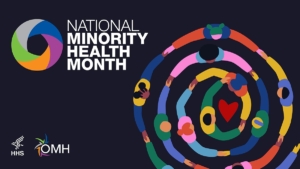Leadership Lesson – April 2024: Health in Action – Lessons from the Field for National Minority Health Month
Words of advice from leaders on the front lines.
This month’s leadership lesson is from Rosa Abraha, MPH, Alliant Health Solutions Health Equity Lead.

In recognition of National Minority Health Month, we celebrate the strides made in advancing health equity and reflect on the lessons learned from real-world experiences. Through the incredible stories and insights from the field through our HQIC, QIN-QIO and Georgia Flex contracts, we glean valuable lessons that inspire us to continue our journey toward health equity for all.
Here are the three most impactful lessons on health equity from the front lines of healthcare:
- Health Equity is a Group Project
- Lesson: Achieving health equity is a collaborative effort requiring active buy-in and participation from clinical, community, and other local, state, and national collaborators. Diversity is our strength, and inclusion is our responsibility. We must recognize that health disparities are not merely the responsibility of singular clinical or community organizations but require flexible and multifaceted approaches of diverse stakeholders working together towards a common goal.
- Action: Develop your health equity taskforce by fostering partnerships with clinical institutions, faith-based organizations, community leaders, policymakers, educators, and social service agencies that value the shared responsibility and collective action needed in designing and implementing interventions to promote health equity. Meet regularly and encourage open communication, mutual respect, and shared decision-making among all stakeholders.
- Alliant Tool: There’s no action without a plan, and much like you plan for quality initiatives, it’s imperative that your health equity taskforce create a plan, at least annually, for your health equity goals. Stuck on where to start? Here’s a health equity strategic planning template I created for you to get started and a filled-out example of how I would complete a health equity strategic plan if I were in your position.
- Building Trust Through Cultural Competence is Imperative
- Lesson: Culturally competent care builds trust and fosters positive health outcomes. Take the time to understand the cultural backgrounds, beliefs, and practices of the communities you serve, so you don’t simply treat the condition but provide whole-person-centered care.
- Action: Invest in cultural competency and motivational interview training for healthcare providers and staff to ensure respectful and effective communication with patients from diverse backgrounds.
- Alliant Tool: Here’s our YouTube playlist of bite-sized learning videos we created for you and your team addressing health literacy challenges and providing culturally and linguistically appropriate patient care. You are welcome to upload these videos into your hospital learning systems, such as HealthStream, and offer this training for all current and newly incoming staff and leadership.
- Addressing Social Determinants of Health is Key
- Lesson: 80-90% of health outcomes are influenced by social, economic, and environmental factors beyond the scope of clinical care. Take a holistic approach to healthcare by addressing social determinants of health such as housing instability, food insecurity, and lack of access to transportation.
- Action: Create a transparent list of local, state, and national partners who provide services that address the root causes of health disparities, not merely their symptoms, and make this list available across the organization and to all individuals in need. Some key places to have this list made available are the front desk with registration, the emergency department, and the nursing and case management teams.
- Alliant Tool: Do you need an easy-to-use, fillable referral tool to provide to patients who screen positive for one or more social determinants of health? You’re in luck—we have just the tool. You can download it and add your SDOH partners to it here.
As we commemorate National Minority Health Month, I honor the incredible commitment of our clinical, community and other partners to taking meaningful action towards achieving health equity for all. By applying these insights in our work and communities, we can continue to make a positive impact and create a healthier, more equitable future. We also invite you to continue to join us in imperative teaching and peer learning on health equity topics by registering for our HQIC Monthly Health Equity Office Hours here and visiting our website for past health equity presentations and resources under “Education on Demand.”